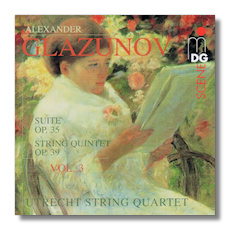
The Internet's Premier Classical Music Source
Related Links
- Glazunov Reviews
- Latest Reviews
- More Reviews
-
By Composer
-
Collections
DVD & Blu-ray
Books
Concert Reviews
Articles/Interviews
Software
Audio
Search Amazon
Recommended Links
Site News
 CD Review
CD Review
Alexander Glazunov

String Quartets, Volume 3
- Suite in C Major for String Quartet, Op. 35
- String Quintet in A Major, Op. 39
Utrecht String Quartet
Michael Stirling, cello
Dabringhaus & Grimm MDG6031238-2 65m DDD
It may seem strange but Alexander Glazunov, considered as one of Russia's greatest symphonic composers, had a strong predilection for chamber music, and he is seen as the first Russian composer who took a serious interest in the genre. [Except, of course, for Tchaikovsky, Borodin, Glinka, Rubinstein, and Taneyev whose chamber music pre-dated Glazunov's.]
This is a third volume dedicated to his complete string quartets and is certainly the most interesting issue so far. The Suite Op. 35 was written in 1887 when the composer was just 22, and for the first time in his already successful career, Glazunov deliberately left out the dominance of Slavonic themes without ignoring them completely. The work might have also been intended as a series of miniature studies, but whatever his intention, the suite has a feisty dance element and the music develops spontaneously from the motifs and ideas embellished with brilliant harmonic touches.
The String Quintet of 1892 uses two cellos instead of a viola, a grouping close to Schubert's heart, but Glazunov in no way tries to duplicate the Viennese master's style. Indeed this superbly crafted piece is extremely attractive, displaying compositional virtuosity at the expense of profundity. The opening "Allegro" is lively and charming, a movement which is strongly contrasting to the cheerful pizzicato and elegiac interludes of the Scherzo and Allegro.
The Utrecht Quartet play these pieces with great rhythmic virtuosity, superb ensemble and good rhythmic vision. This release is highly recommended for those who are not yet aware of the attractive qualities of Glazunov's chamber music.
Copyright © 2008 by Gerald Fenech


















